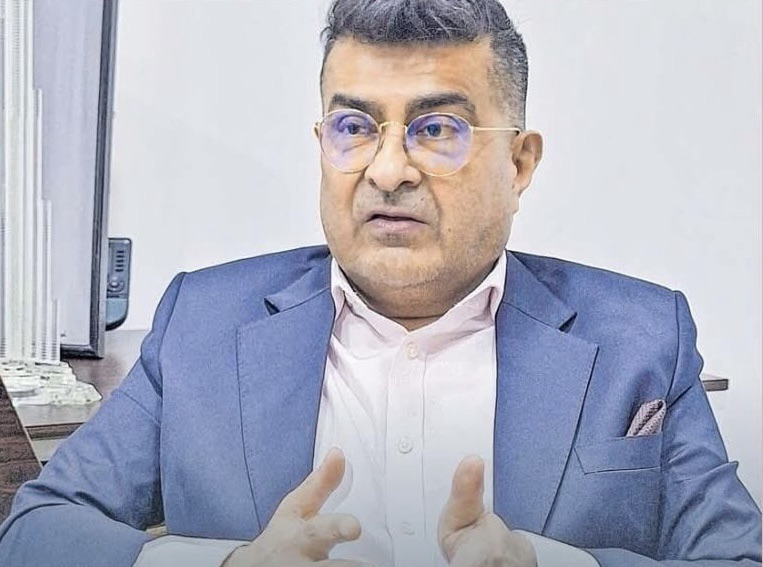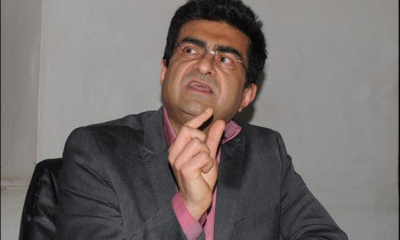Investigations
What Kamlesh Pattni Has Become: From Goldenberg Architect to International Pariah
Pattni has evolved from a domestic scam artist into an international operator whose activities have caught the attention of the world’s most powerful governments.

An Investigation into the Transformation of Kenya’s Most Notorious Businessman
In the opulent confines of a Dubai hotel room, surrounded by lawyers clutching wheeled briefcases full of documents, sits a man who has spent the last three decades as one of Africa’s most controversial figures.
Kamlesh Pattni, the architect of Kenya’s infamous Goldenberg scandal, has transformed from a young goldsmith into what international authorities now call the leader of a global gold smuggling and money laundering network.
At 60, Pattni cuts a different figure than the brash 25-year-old who once convinced Kenya’s government to pay him billions for non-existent gold exports. Gone is the flashy businessman of the 1990s.
In his place sits “Brother Paul,” a self-proclaimed Christian preacher who punctuates his carefully measured responses with phrases like “glory to God” and claims his net worth exists “in heaven.”
But beneath this religious veneer lies a troubling reality: Pattni has evolved from a domestic scam artist into an international operator whose activities have caught the attention of the world’s most powerful governments.
The Making of an International Criminal Network
The transformation began after Pattni quietly slipped out of Kenya in 2021, ostensibly when COVID-19 travel restrictions lifted. What followed was a methodical expansion of operations across Southern Africa that would eventually trigger one of the most significant sanctions actions against African gold traders in recent history.
Al Jazeera’s undercover operation shows that Pattni is now involved in a similar scam in Zimbabwe, exporting gold to Dubai and then laundering both the money and the precious metal.
The 2023 “Gold Mafia” documentary exposed a sophisticated network that dwarfed his earlier Kenyan operations in both scale and international reach.
The global network led by Kamlesh Pattni (Pattni) has facilitated illicit activities by bribing officials, deploying trusted supporters to mask ownership, and weaving a global web of businesses to hide the illicit activities.
According to the U.S. Treasury Department, this wasn’t just gold smuggling—it was systematic looting that has “robbed Zimbabwe’s citizens of the benefit” of their natural resources.
Sanctions and the Price of Notoriety
In December 2024, the consequences of Pattni’s expanded operations finally caught up with him.
The measures, including asset freezes, confiscation of property and travel bans, target Kenyan-British businessman,
Kamlesh Pattni. Pattni allegedly bribed officials in Zimbabwe to earn illicit profits from the country’s gold and diamond trade.
The sanctions weren’t limited to Pattni alone. Sanctions have also been imposed on Pattni’s wife and brother-in-law for their involvement in Russian money laundering through the gold trade, connecting his network to broader geopolitical concerns about financing Russia’s war in Ukraine.
When confronted about these sanctions during our exclusive interview, Pattni dismissed them as “misinformed and based on fake news.”
He claims to have petitioned the U.S. Office of Foreign Assets Control with “facts different from what they saw in the Al Jazeera expose,” but provides no evidence that these appeals have gained traction.
The Niger Gambit: A Defiant Return to Form
Perhaps most remarkably, even under international sanctions, Pattni hasn’t retreated. Instead, he’s doubled down with his most audacious move yet.
The agreement, inked on Wednesday, 23 April 2025, creates Royal Gold Niger SA, a joint venture between Niger’s government and Dubai-registered Suvarna Royal Gold Trading LLC, where Pattni is chief executive.
Despite his international reputation — which includes alleged involvement in Kenya’s infamous Goldenberg scandal and fresh sanctions slapped on him in 2023 for his alleged role in a gold smuggling network — Pattni was received with full honours in Niamey, as Niger pitched the project as a step toward economic sovereignty.
The Niger deal reveals much about what Pattni has become: a man who views international sanctions not as a deterrent but as a business obstacle to be circumvented.
His explanation for how he secured the deal despite being sanctioned is telling: “Niger is a military-based government and it’s not like you can go and they know you are like a conman or something. They have got intelligence checks.”
This suggests Pattni has learned to leverage geopolitical tensions, targeting governments that may be less concerned about Western sanctions or more willing to challenge international financial controls.
The Preacher’s Paradox
Central to understanding what Pattni has become is his transformation into “Brother Paul,” a Christian preacher who claims to have “converted a lot of Mungiki” and planted churches across multiple countries.
This religious identity isn’t mere window dressing—it’s become integral to his self-presentation and, arguably, his business model.
“I only fear God because he is the one who passes the judgement,” he told us when asked about seeking forgiveness for his role in Kenya’s economic troubles. “You think I would be sitting here if I had done a crime?”
This fusion of religious conviction with criminal enterprise creates a fascinating psychological profile.
Pattni genuinely appears to believe that his activities serve a higher purpose, frequently claiming that Goldenberg “saved Kenya” and that his current operations help countries “achieve the best out of their minerals.”
The Pattern Emerges
What emerges from three decades of following Pattni’s career is a clear pattern: he identifies countries with weak governance structures, valuable natural resources, and desperate need for foreign exchange.
He then presents himself as a solution—a man with the international connections and expertise to unlock their potential.
His claim that Niger produces “96 tonnes” of gold annually while official statistics show only “six to seven tonnes” echoes his original Goldenberg pitch: there’s massive hidden value that only he can access.
The fact that this value involves circumventing international oversight isn’t a bug in his system—it’s a feature.
What Pattni Represents
Kamlesh Pattni has become something unique in African business: a transnational criminal entrepreneur who operates at the intersection of legitimate government partnerships and illicit financial networks.
He’s learned to weaponize weak governance, exploit sanctions regimes, and leverage geopolitical tensions to maintain operations despite international pressure.
His evolution from domestic scam artist to international sanctions target reflects broader changes in how financial crime operates in the 21st century.
Where once criminals were limited by geography and technology, figures like Pattni now operate across continents, utilizing everything from shell companies to cryptocurrency to religious ministries as vehicles for their activities.
The Unrepentant Legacy
Perhaps most striking about Pattni today is his complete lack of remorse.
He shows no acknowledgment that his activities have harmed anyone, instead presenting himself as a misunderstood entrepreneur whose only crime was being ahead of his time.
“I have done good to Kenya,” he insisted during our interview. “The record speaks for itself. I have forgiven all those who persecuted me because they wanted me finished. I don’t know what I should repent about.”
This unrepentant stance, combined with his continued operations despite international sanctions, suggests Pattni will remain a disruptive force in African mineral markets for years to come.
At 60, showing no signs of slowing down and backed by what he claims is divine mandate, Kamlesh Pattni has become something perhaps more dangerous than a simple criminal: a true believer in his own mythology.
The question isn’t whether Pattni will attempt another major scheme—it’s where and when.
And given his track record of identifying vulnerable systems and exploiting them with remarkable persistence, the international community would be wise to take notice of wherever this self-proclaimed prophet of gold next decides to perform his “miracles.”
This investigation is based on exclusive interviews, court documents, and extensive research into public records. The author attempted to reach representatives of the governments of Niger, Zimbabwe, and Kenya for comment, but received no responses by publication time.
Kenya Insights allows guest blogging, if you want to be published on Kenya’s most authoritative and accurate blog, have an expose, news TIPS, story angles, human interest stories, drop us an email on [email protected] or via Telegram
-

 Grapevine1 week ago
Grapevine1 week agoAlleged Male Lover Claims His Life Is in Danger, Leaks Screenshots and Private Videos Linking SportPesa CEO Ronald Karauri
-

 Lifestyle2 weeks ago
Lifestyle2 weeks agoThe General’s Fall: From Barracks To Bankruptcy As Illness Ravages Karangi’s Memory And Empire
-

 Grapevine4 days ago
Grapevine4 days agoRussian Man’s Secret Sex Recordings Ignite Fury as Questions Mount Over Consent and Easy Pick-Ups in Nairobi
-

 Investigations2 weeks ago
Investigations2 weeks agoEpstein Files: Sultan bin Sulayem Bragged on His Closeness to President Uhuru Then His Firm DP World Controversially Won Port Construction in Kenya, Tanzania
-

 Business2 weeks ago
Business2 weeks agoKRA Can Now Tax Unexplained Bank Deposits
-

 Investigations1 week ago
Investigations1 week agoEpstein’s Girlfriend Ghislaine Maxwell Frequently Visited Kenya As Files Reveal Local Secret Links With The Underage Sex Trafficking Ring
-

 News1 week ago
News1 week agoState Agency Exposes Five Top Names Linked To Poor Building Approvals In Nairobi, Recommends Dismissal After City Hall Probe
-

 Investigations23 hours ago
Investigations23 hours agoMulti-Million Dollar Fraud: Three Kenyans Face US Extradition in Massive Cybercrime Conspiracy




























